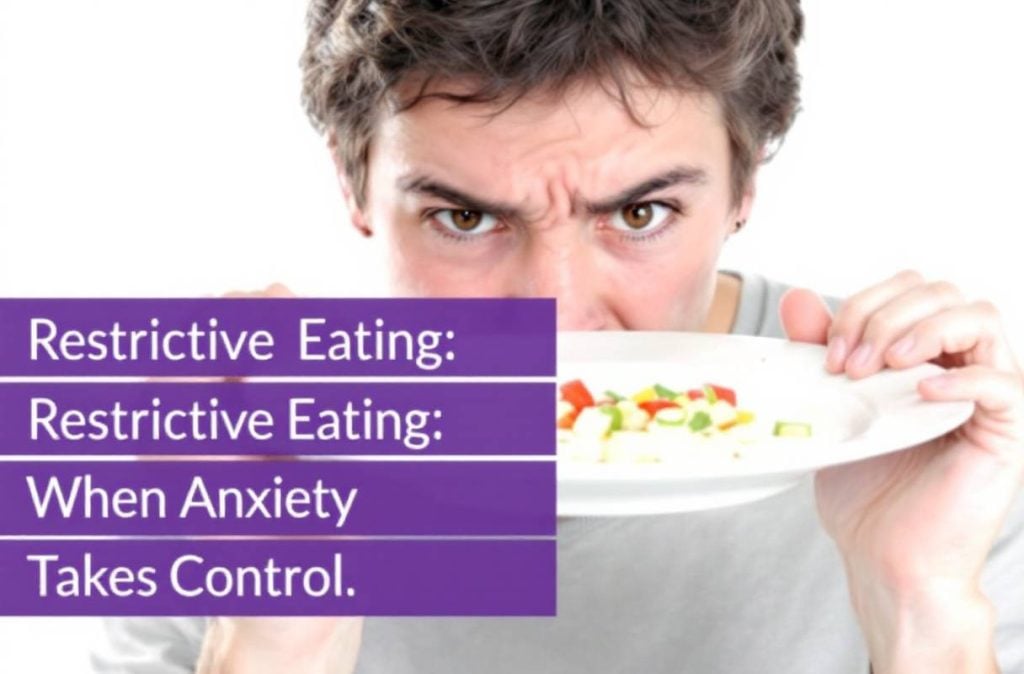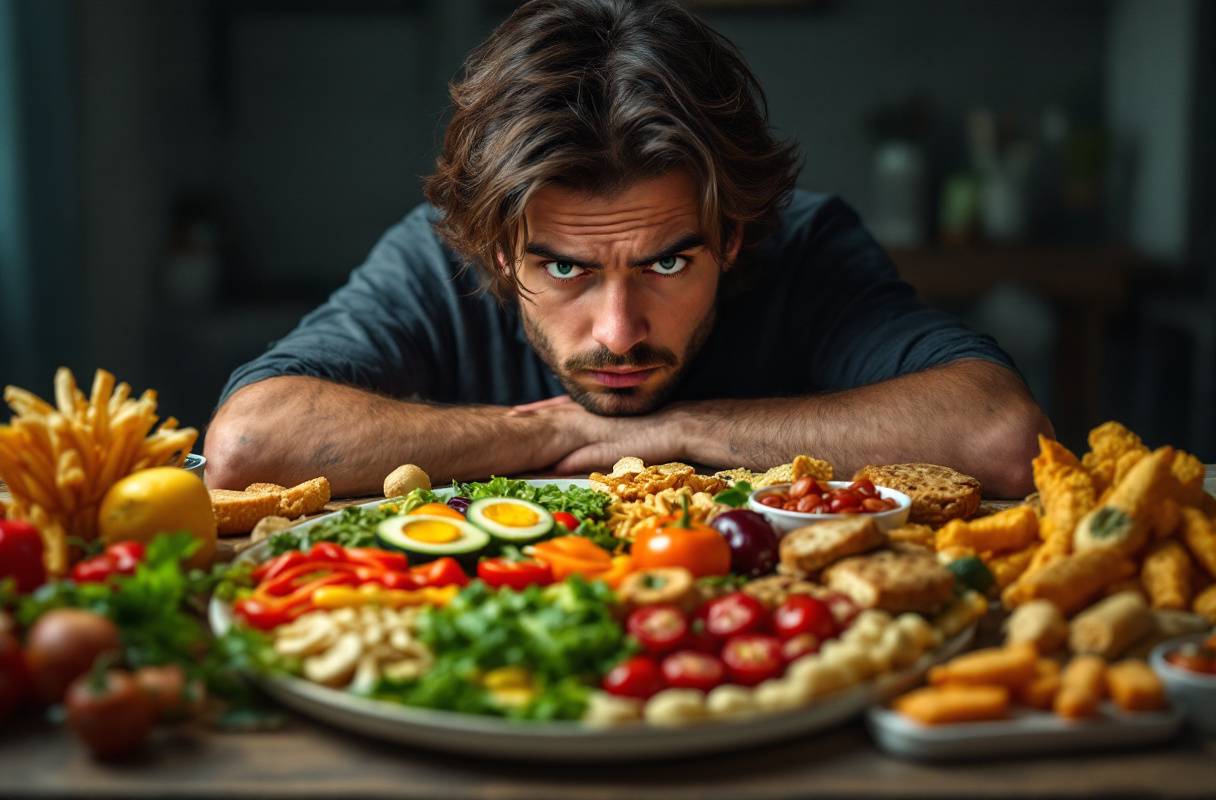Ever notice how stress can have you reaching for snacks, even when you’re not hungry? Anxiety doesn’t just play with your mind; it has a surprising influence on your eating habits too. From emotional munching to skipping meals, the way we respond to anxiety can drastically change our relationship with food. Let’s dig into how this complex relationship unfolds and learn how to regain control of our eating patterns by understanding the powerful role anxiety plays.
The Impact of Anxiety on Eating Habits
How’s anxiety affecting everyone’s trips to the fridge? It can really mess up eating patterns, leading to habits that might not be the healthiest. Figuring out why anxiety makes us eat the way we do is key to getting things back on track.
Understanding the Link between Anxiety and Eating Habits
Anxiety and how we eat are strangely linked. When someone’s feeling anxious, their body spirals into a whirlwind of changes like lost appetite or extreme hunger. This “fight-or-flight” mode can make some folks skip meals, while others might raid the snack stash.
Blame it on the body’s hormones, like cortisol and adrenaline, putting everything out of whack. Too much cortisol, for example, might have the body screaming for junk food. It’s a bit like a hamster wheel — anxiety tweaks eating habits, and then those habits can ramp up the anxiety right back.
Common Eating Patterns Associated with Anxiety
Different people, different strokes, right? But anxiety often brings out a few favorite eating habits. Some turn to food when emotions hit hard, while others might stop eating to feel in control. Many might pack in food like there’s no tomorrow and even sneak bites in private.
| Eating Pattern | What It’s All About |
|---|---|
| Emotional Eating | Munching when sad, happy, bored — you name it, but not hungry. |
| Stress Eating | Eating more when life’s going bananas. |
| Restrictive Eating | Skipping meals to get some grip on anxiety. |
| Binge Eating | Having a feast, but keeping it under wraps from everyone else. |
Want to dive deeper into these behaviors and their ties to anxiety? Check out our reads on emotional eating and handling stress better with stress management techniques.
Recognizing these habits is like spotting a frenemy; once pinpointed, you can tackle them. By trying out mindful eating strategies and other tricks of the trade, anyone can start mending their connection with food.
Emotional Eating
Emotional eating is when folks snack to handle stress or worry instead of filling up an empty tummy. Here, we’ll dig into why emotional eating happens and look at what usually sets it off.
What Is Emotional Eating?
Emotional eating happens when people chow down to handle feelings, not hunger pangs. It often leads to munching on comfort foods loaded with calories. Sure, it feels good for a minute, but it can mess with your health in the long run.
| Emotional Eating Factors | Description |
|---|---|
| Emotional Relief | Eating food to chill out from stress or nerves, even just for a bit. |
| Comfort Foods | Going for high-calorie, sugary, or salty treats. |
| Physical vs. Emotional Hunger | Emotional hunger hits out of nowhere and picks specific foods; real hunger grows over time and can be satisfied with any snack. |
Though it might feel good right then and there, emotional eating can spiral into guilt and more stress, adding to your worries. Check out our article on coping with emotional eating for more tips on managing this.
Triggers for Emotional Eating
Figuring out what triggers emotional eating is key to keeping it in check. Various things can kick off this habit:
- Stress and Anxiety: Stress ramps up cortisol, making you crave sugary, greasy foods. Discover ways to handle stress in our stress management techniques article.
- Emotional Distress: Whether it’s feeling sad, lonely, or mad, these emotions might send you straight to the pantry. Practicing mindfulness for emotional regulation can help you handle these feelings better.
- Social Influences: Being around others and social events can also push you towards emotional eating, especially when food’s the star of the show.
| Trigger | Description |
|---|---|
| Stress | Stress hormones skyrocket, pushing you towards junk food. |
| Emotional Distress | Grabbing food to cope with difficult emotions. |
| Social Influences | Giving in to peer pressure or social settings centered on eating. |
Spotting these triggers lets you find other ways to deal that don’t involve food. Try out stress-reducing activities and build positive relationships for mental health for some support. Learning self-compassion techniques can cut down on the guilt tied to emotional eating. If you need more help, check out top online therapy platforms for pro advice and strategies tailored to you.
Stress Eating
When life’s pressures pile up, folks often turn to munching for comfort. Grasping the connection between stress and munchie habits is crucial to tackling this common struggle.
The Relationship Between Stress and Eating
Stress messes with the body, prompting cortisol to kick in. This sneaky hormone can make you hungrier than a bear in winter. When stress lingers, people might find themselves raiding the pantry like it’s a treasure trove. This leads to stress eating, usually involving treats packed with sugar and fat, as they give a quick emotional lift.
| Trigger | What Happens |
|---|---|
| Cortisol’s Party | Makes You Want to Eat More |
| Emotional Turmoil | Leads to Seeking Comfort in Snacks |
| Feeling Worn Out | Craving Calorie-Heavy Munchies |
Those in stress-filled environments, like busy workers or super parents, are especially prone to stress eating. Spotting these patterns is key to cooking up better ways to cope. For more on this, check out our page on stress-busting tips.
Coping Mechanisms for Stress Eating
Need to beat stress munchies? It’s all about mixing emotional smarts with practical tricks. Here’s a handful of coping strategies:
- Mindfulness Magic: Being mindful helps shine a light on eating habits and what sets off stress eating. Doing things like breathing exercises or meditating can work wonders. Dive deeper into this with our post on mindfulness for cool heads.
- Healthy Swaps: Replace those calorie bombs with goodies like fruit, veggies, and grains. Keep the good stuff handy to avoid the lure of junk food.
- Move That Body: Exercise shakes off stress and brightens moods, making stress eating less appealing. Want to know more? Pop over to our write-up on how exercise fights the blues.
- Lean on Friends: Chatting with pals, family, or a counselor can lift spirits and curb the munchies urge. Strong connections can turbocharge mental wellness. Get more insights from friendship and well-being.
- Plan Your Eats: Stick to a steady meal routine to keep hunger and impulse chomping in check. Planning your meals and snacks keeps the diet balanced and on track.
Need more pointers? Check out our guides on managing munchies like cracking emotional eating and why expert advice rocks in the best online therapy spots.
Putting these strategies into action can help break free from stress eating and form healthier habits. Recognizing the signs and taking decisive action can do wonders for overall well-being.
Restrictive Eating

Restrictive eating is like putting your body on a strict diet mood without a reasonable cause, usually due to nervousness and the fear of gaining weight. Picking up on the signs of restrictive eating is a step towards nipping the issue early.
Signs of Restrictive Eating Behavior
Spotting signs of restrictive eating behavior is important to tackle the problem before it gets worse. Check out these common behaviors:
- Skipping Meals: Playing hide and seek with meals to cut down calories.
- Calorie Counting Obsession: Always on the calculator, keeping calories tight.
- Avoiding Food Categories: Shunning whole types of foods, like carbs or fats.
- Weird Food Habits: Practicing odd eating styles, like slicing food into minuscule bits or munching at snail’s pace.
- Over-the-top Exercise: Working out excessively to torch away imaginary excess calories.
- Dodging Social Events: Steering clear of gatherings with food involved.
Ways Anxiety Leads to Restrictive Eating
Anxiety has this way of twisting how we eat, often pushing folks into restrictive eating habits:
Control Over Anxiety
This kind of eating crops up from the wish to have a firm grip over their world, especially when everything else feels out of whack. By being picky about what goes into their mouths, some might find a peace of mind kinda vibe.
Fear of Weight Gain
Anxiety can blow worries about how one looks and weighs out of proportion. The dread of becoming heavier leads some to cut their food way back. If you’re curious about these concerns, check out depression body image.
Perfectionism
If you’re a perfectionist, you might expect yourself to look like someone from a magazine. This “no-slip” philosophy often turns into not-so-good eating habits in striving for that “perfect” figure. Check out tips on handling this trait in managing perfectionism.
Social and Media Influence
Magazines, TV, and social media often show ideal body images that can hike anxiety levels and foster restrictive eating. The internet, especially, can meddle with self-esteem and eating habits. More info on this is available in our article on social media self-esteem.
Physiological Effects of Anxiety
When anxiety hits, it can mess with your digestion and throw off your appetite, which might lead to cutting back on food unintentionally. The queasy feeling tied to anxiety can make eating seem like a chore.
Doing anxiety-busting practices could dial down restrictive eating habits. Helpful techniques like mindfulness and CBT can make a difference. For detailed insights, explore mindfulness for emotional regulation and cbt for negative self-talk.
Table of Common Triggers and Behaviors
| Trigger | Behavior |
|---|---|
| Desire for Control | Skipping Meals |
| Fear of Weight Gain | Avoiding Food Categories |
| Perfectionism | Calorie Counting Obsession |
| Social Media Influence | Weird Food Habits |
| Physiological Effects | Over-the-top Exercise |
Catching these warning signs and knowing how anxiety plays into restrictive eating is crucial for getting the right help and support. Head over to our article on coping with emotional eating for more tips.
Binge Eating
Definition and Characteristics of Binge Eating
Binge eating involves scarfing down way more food than your stomach can handle, often in record time. This feast usually leaves folks feeling like they’re not in control, and then, bam—here comes the guilt and shame.
Here’s how you know if binge eating is crashing your party:
- Wolfing down at lightning speed
- Eating until you feel like a stuffed turkey
- Snacking when your stomach’s not even growling
- Chowing down solo because, well, who’s gonna see?
- Ending up feeling like you’ve been hit by a regretful freight train
It’s no joke—binge eating’s a legitimate health snag that needs some attention. It’s about figuring out what sets it off, like a little anxiety gremlin whispering in your ear, that can really help kick this behavior.
How Anxiety Contributes to Binge Eating
Anxiety is like that nosy neighbor who pokes their head in and messes with your eating habits, pushing you toward binge eating. When anxiety turns up the heat, some folks dive headfirst into a bowl of comfort food. But irony alert—this can just pile on more stress and spark yet another binge.
Here’s how anxiety plays the middleman to binge eating:
- Feeling Better (Sort of): Anxious folks might tackle stress with their faces in a cake. Sure, it feels good for a second, then it’s back to the anxiety drawing board.
- Brain Hijack: Sometimes, the solution to shutting out pesky worrying thoughts is drowning them out with the crunch of chips. The problem is, that munching only mutes the worry temporarily.
- Body Freak-out: Anxiety stirs up all sorts of bodily chaos, like showering your system with cortisol—cue those insatiable cravings for greasy or sugary binges.
- Social Ghosting: With anxiety, face-to-face hangouts can seem like too much. Withdrawing makes it easier to binge in private without anyone the wiser.
Linking anxiety and binge eating helps folks whip up plans to cut back on binge episodes. Practicing stuff like mindfulness and kicking stress management into gear can really help break the habit.
| Problem | Eating Habit |
|---|---|
| Emotional Mess | Chowing down on anything edible to pacify emotions |
| Hermit Mode | Solo eats escalate into eating sprees |
| Hormone Havoc | Egged on cravings for everything calorie-loaded |
| Sky-high Boredom | Filling the yawning boredom gap with constant munching |
To dig deeper into beating these binge triggers, take a look at our write-ups on handling emotional eating and strengthening mental grit. Nabbing professional guidance and digging into what’s feeding the anxiety beast can go a long way in sorting out both your hip and head space.
Mindful Eating Strategies
Mindful eating strategies can work wonders in tackling anxiety-related eating habits. They nudge folks to pay closer attention to their eating patterns, fostering a healthier bond with food.
Techniques to Tackle Anxiety-Driven Eating Habits
Trying out mindful eating tricks can help folks keep a lid on anxiety’s impact on their eating ways. Here are some ideas that might just do the trick:
- Deep Breathing: Before digging in, take a few deep breaths. It can calm you down and help keep anxiety in check, so you’re in a better headspace for your meal.
- Take It Slow: Chew your food slowly, savoring each bite. It’s not only good for your digestion but also helps prevent eating too much, giving you time to feel full.
- Use All Your Senses: Really notice the smell, taste, texture, and look of your food. It makes eating more fun and stops those autopilot snack attacks.
- Stick to Meal Times: Having set meal times helps you stay in tune with your hunger, cutting down on emotional munching.
- Food Diary: Jotting down what you eat and when can help you spot patterns and figure out what’s triggering those anxiety. Knowing gives you the power to make better food choices.
For more ways to handle stress eating, head on over to our piece on coping with emotional eating.
Building a Healthy Relationship with Food
Having a good vibe with food is key to feeling great. Here’s how to give your food mindset a boost:
- Skip the “Good” or “Bad” Labels: Labeling food as good or bad can pile on guilt. Instead, embrace balance—there’s a place for all foods in a healthy diet.
- Tune Into Hunger Signals: Listen up when your body signals hunger or fullness, rather than eating because emotions tell you to. It’ll keep you from overeating and make meals more satisfying.
- Show Yourself Some Love: Go easy on yourself and sidestep self-criticism about eating habits. Remember, a treat now and again is part of normal eating, not the measure of your overall diet.
- Get Some Backup: Chatting with a friend, family, or a pro about your anxiety and food struggles can offer new perspectives and a morale boost. We have more tips on this at the importance of seeking professional help.
- Find Joyful Distractions: Dive into activities that lift your spirits, like exercise, meditation, or hobbies. They’re great ways to distract yourself without reaching for comfort food.
To dig into how mindfulness can weave into everyday life, take a look at mindfulness for emotional regulation.
By weaving these mindful eating tactics into your routine, you can take on anxiety-induced eating patterns and build a more thoughtful relationship with food. This all-around approach paves the way for better mental and physical health, boosting your ability to handle anxiety and enjoy a varied, satisfying diet.
Seeking Support
The Role of Getting Professional Help
Figuring out the mess of anxiety and eating habits often needs a pro’s touch. Chatting with a mental health expert can open up some handy insights and plans that fit just right for you. They offer a friendly and no-judgment zone to figure out why anxiety might mess with how you eat—whether you’re eating when stressed, restricting yourself, or binging.
Reaching out for help shapes up a full-on plan tackling both mind and body wellness. Therapists, counselors, and dietitians put their heads together to set you up with a balanced approach, making sure your eating and peace of mind get back on track. Cognitive Behavioral Therapy (CBT) is a pretty neat way to handle anxiety and eating quirks. Want to dive deeper? Peek at our piece on CBT for negative self-talk.
Ways to Tackle Anxiety and Eating Habits
Snagging the right resources is a big win in managing anxiety and its eating side effects. Check out some top-notch resources:
Therapy and Counseling
Hooking up with therapists who really dig into anxiety and eating disorders can work wonders. If in-person ain’t your thing, online therapy is super handy. Take a gander at our guide on the best online therapy platforms for more deets.
Support Groups
Being part of a group where folks share the same boat gives a sense of belonging. Hearing “you’re not alone” when dealing with anxiety and eating struggles is comforting. These groups have your back with practical tips and heapings of moral support.
| Resource Type | Description |
|---|---|
| Therapy and Counseling | Guidance from ace therapists |
| Support Groups | Group support sharing similar paths |
Books and Articles
Books and online reads can shine a light on mental wellness and mindfulness. They’re goldmines for understanding and tackling anxiety. Curious about what to read next? Dig into our list of the top mental wellness books.
| Resource | Description |
|---|---|
| Books and Articles | Gems on anxiety and mindful eating |
Do-It-Yourself Techniques
Do-it-yourself stuff like mindfulness, meditation, and handling stress can pack a punch. Mindfulness keeps you in the now, helping you eat mindfully. Check out mindfulness for emotional balance for more.
| Technique | What’s in it for you |
|---|---|
| Mindfulness | Keeps you present, aids smart eating |
| Meditation | Chills anxiety, brings calm |
| Stress Management | Coping skills for handling stress |
Using these tools can seriously boost your way of dealing with anxiety and bettering your eating habits. For a deeper dive into resilience and mental health wellness, see our article on building mental resilience.
Conclusion
Anxiety’s grip on your eating habits is real, but recognizing the patterns is the first step to breaking free. Whether it’s emotional eating, stress munching, or even binge eating, understanding the triggers can lead to healthier behaviors.
By practicing mindful eating, managing stress, and seeking professional help, you can nurture a balanced relationship with food. Remember, taking control of your eating habits is also about managing anxiety, one mindful bite at a time. If you ever feel overwhelmed, support is just a conversation away.
FAQs
1. How does anxiety impact eating habits?
Anxiety can lead to emotional eating, stress-induced cravings, or even skipping meals. Hormonal changes, like increased cortisol, often cause overeating, while some may restrict food as a form of control.
2. What is emotional eating?
Emotional eating occurs when people eat in response to their feelings, not hunger. Anxiety, stress, or sadness can prompt individuals to reach for comfort foods, typically high in calories.
3. Why do stress and anxiety lead to overeating?
Stress triggers the release of cortisol, which can make you crave high-calorie, sugary foods. These foods provide short-term relief, but this habit can lead to weight gain and even more stress.
4. What is restrictive eating, and how is it tied to anxiety?
Restrictive eating involves limiting food intake due to anxiety, often in an attempt to control weight or stress. It can result in unhealthy eating patterns and nutritional deficiencies.
5. Can binge eating be caused by anxiety?
Yes, binge eating often occurs when anxiety spirals out of control, leading individuals to consume large amounts of food rapidly as a coping mechanism, followed by feelings of guilt and shame.




















